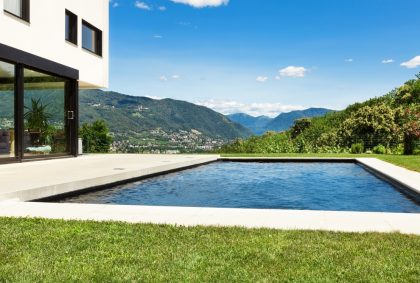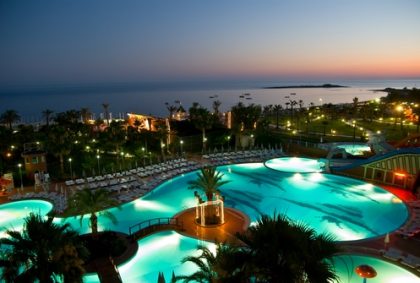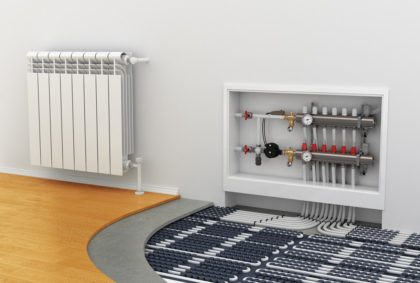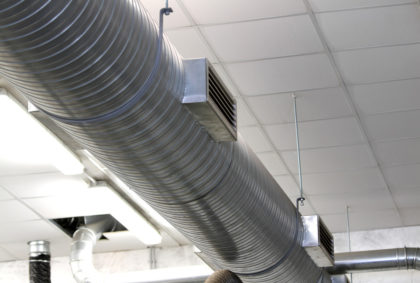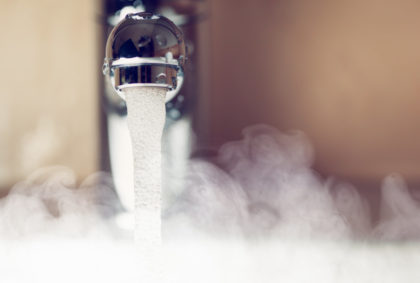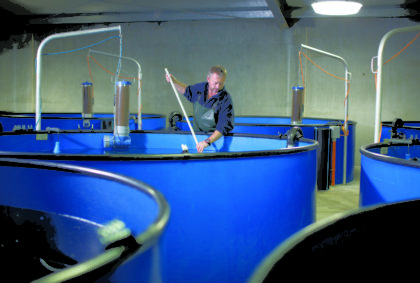Like any major purchase, would-be buyers will often have a number of questions they need answered before taking the next step in purchasing a pool heater. At Rheem Thermal, we know the value of being open with our clients and letting them gather as much information as they need to make an informed purchase.
To help buyers on that journey, we have completed this useful FAQ section that can answer some of the most common questions we hear from customers
When looking to install a pool heating solution, many buyers will encounter four possible heating methods. These are:
Solar
Flexible strip and rigid panel solar has been used to heat swimming pools for decades and would easily be the most common form of pool heating to Australian homes. The pool water will be circulated through the solar strip or panel to absorb heat which in turn heats the pool.
Electric element
An electric element works like your kettle at home – providing direct heat transfer between a source of heat and pool water. The advantage of these systems is their compact size and the fact they can operate in areas where a gas supply cannot be used. However, element heaters have a relatively high electrical demand so can be the most expensive option in terms of heating cost.
Electric heat pump
Electric heat pumps harness the natural warmth contained in the atmosphere and use this to heat a swimming pool. They do this by pulling in large quantities of air from the atmosphere and drawing out the heat, in order to then transfer it to the pool water. Not only is this incredibly energy efficient, it is also the cheapest option when used during off-peak times.
Gas Heating
A gas solution is perhaps the most flexible option, giving pool owners the ability to heat their pool at virtually any time of the year, within a relatively short period of time. Of course, those who pursue this option will need to be sure they have access to a gas supply that can power their pool heater.
The right pool heating solution for your needs will depend on a number of factors such as where your property is located, local energy pricing, how easy it is to supply gas and also your expectations in terms of ongoing costs.
For example, an electric heat pump can work best in a warmer climate, although they can operate effectively in any part of Australia. Gas heating on the other hand, has the flexibility to be used both for occasional entertaining as well as providing continual heat. A gas solution can also be combined with solar to provide heat at night or in cloudy conditions – when the solar is less effective.
Unlike many consumer products, there are no star ratings or energy labelling requirements when it comes to pool heat pumps. Indeed, the import of these is relatively unregulated. As a consequence, there are obvious disparities between how a heat pump is rated between manufacturers, particularly between Australian and imported heaters. For the purchaser, it is vital to understand how a heat pump is rated and to know how to look for rating information in a sales brochure. Without this, it is impossible to make a valid price comparison, or indeed to know if the heater will have sufficient heating capacity to provide the pool season or temperature required.
The rating of a heat pump is its nominal heating capacity. For example, a 10kW heat pump will provide 10kW of heat transfer (measured by the change in water temperature relative to the water flow rate).
The trick with heat pump ratings is that the output of a heat pump is not static. This same “10kW” heat pump may output between 7kW to 13kW of heat transfer even in a single day. The variation comes from the changing air temperature at which the unit is operating. Heat pumps provide higher output and efficiency at warmer ambient, when there is more solar capture to be made.
Brochures or sales literature which give you the heat pump output only at high outside temperatures (typically, 27°C) are in effect telling you only the optimal performance of the heater. What is far more important is the ability of the heat pump to produce heat when the air is cold, as it is when the air is coldest that a pool loses the most heat and heating costs are highest. It is for this reason that we provide rating information at 10°C and 27°C ambient.
The best advice for buyers is going to be finding a common rating point between the different products they are considering and use this to make an informed decision. Doing this can give you the best comparison between the output of different pool heaters and also whether the capacity can match the loss of heat that occurs from the surface of the pool. Looking for the heat pump’s input KW figure may provide an easier basis to compare (as this identifies the compressor horse power), more so than the heating output.
The efficiency of a heat pump is measured by its co-efficient of performance (COP). The COP is derived by dividing the total heat transfer by the electrical input. That is, the heat output (in kilowatts) divided by the input.
The COP is a measure of efficiency, so the higher the figure, the better the heat pump design.
It’s important to note that the COP of heat pumps will vary, even between heat pumps with an identical compressor capacity. As we have already described, the energy efficiency of a heat pump is affected by the ambient temperature it is operating in but more fundamentally, it is impacted by the quality of design and the design intent. Some budget heat pumps which operate at reasonable efficiency when the air is warm will simply not function when it is cold. Indeed, some are programmed to switch off if the outside air temperature falls to 10°C.
The best advice for buyers in regards to making a comparison of heat pumps in terms of efficiency is to look at the total evaporator area of the unit’s design. The evaporator of a heat pump is its solar collector. In simple terms, if the evaporator is small, then the heater will struggle when the air around it is cold.
Choosing the right pool heating equipment will depend on the how much water you are planning to heat and what length of season you desire. How quickly you want it to heat up can also be a factor.
Solar pool heater sizing is traditionally based on the installation of 100% coverage. That is, an area of the flexible collector or solar matting equivalent to the total surface area of the pool is installed to provide strong performance during the “solar” season.
Gas pool heater sizing is also relatively simple. Gas heaters will typically have very strong heating capacity so it is not so much a question of being able to heat your pool to a desired temperature but more simply a question of how quickly this is achieved.
Heat pumps are best chosen with expert assistance. To facilitate this, we offer a detailed service free-of-charge in heat load modelling and a questionnaire detailing the necessary design data is linked to this site.
For any outdoor pool, loss of heat is inevitable and is one of the most important factors for a potential buyer to consider before they commit to a product. It probably won’t surprise you to learn that the greatest loss of heat in a pool will come from the water’s surface.
There are a number of factors that can affect how much heat is lost from a pool’s surface. As a rule of thumb; the bigger the pool, the more heat is going to be lost from the surface.
However, there are other considerations that also need to be taken into account. The average air temperature of your property and the amount of wind that crosses the pool’s surface will both play an important role in determining how much heat is lost here.
Either way, this loss of heat will need to be considered when you invest in a pool heating solution.
In tropical locations, it may be that pool heating isn’t the problem – instead you need a pool that is cool and refreshing to offer some escape from the high temperatures.
Fortunately, heat pumps can be engineered to offer combined heating and cooling, or even just cooling, adding further flexibility to these systems. In climates where the water temperature can naturally be uncomfortably high, being able to maintain a constant refreshing temperature can be the ideal solution.
If you have any further questions regarding the performance of Rheem Thermal pool & spa heaters, make sure to get in touch with us. Our helpful sales staff can answer your enquiries and ensure you are well on the way to securing the right solution for your needs.



